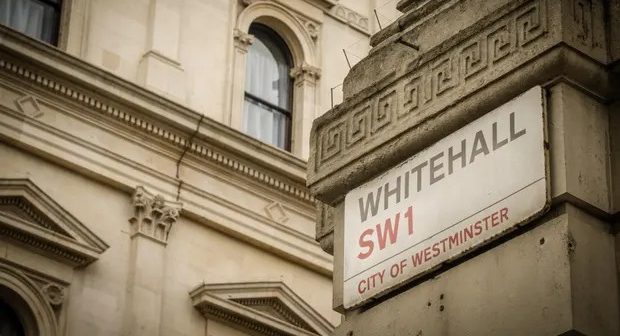Whitehall officials have held high-level talks about taking away a salary boost awarded to London-based civil servants amid efforts to encourage workers back to the office.
The Guardian understands that several government departments have considered stripping some officials of a wage top-up – known as London weighting and worth about £4,000 to offset higher living costs in the capital – if they resist at least a partial return to Whitehall.
Downing Street stressed on Monday that flexible working is here to stay and said there were no plans to dock civil servants’ pay. But the decision ultimately rests with each department, and some Tory MPs have piled pressure on them to take a tougher approach to end the move to working remotely during the pandemic.
At the weekend, Sajid Javid’s health department was revealed to have scrapped plans to end staff’s ability to work completely from home next month. Within hours minsters were anonymously briefing that civil servants should return to the office full-time or have their pay reduced.
Sources said that mandarins have held talks about ways to incentivise a mass migration back to Whitehall this autumn, including withholding London weighting. They said that talks had only reached an early stage. A government spokesperson said: “There are no plans to change terms and conditions around London-based pay.”
Of about 484,000 government workers, 21% are based in London. They get about £4,000 in extra pay compared to their counterparts in other parts of the country.
Those arguing for cutting London weighting say it would save taxpayers money by lowering headcount expenditure and reflect that workers are saving thousands of pounds on travel, including rail season tickets.
But opponents say people working from home still face higher-than-average rental costs and are already saving the government money by bearing the brunt of extra costs such as electricity and wifi bills. Departments also make savings by needing fewer catering, security and estates staff.
There are also concerns that Whitehall could not yet manage a full-scale return to the office, given departments and the teams within them have changed size dramatically due to staff being seconded during the Covid crisis. “This will be tricky,” a senior government source said. “There is no consensus at the moment. No department wants to go out on that limb.”
Some Tory MPs ratcheted up pressure for action on London-based civil servants who do not want to be forced back to the office. “If they are – against advice – choosing not to work in the department, then the London allowance should be reconsidered as it’s not fair,” one told the Guardian. Another said: “Absolutely the London-weighted bit [of their salary]should be withdrawn if they are not commuting into or living in London.”
However, a third MP hit out at the “Stalinist” tendencies of central government “dictating where people should be doing jobs they’ve done perfectly well through the pandemic” and a fourth said some officials would “never need to be in” due to the nature of their work.
In a significant intervention, the FDA union that represents civil servants said “insulting and cowardly attacks” on their members had caused upset and anger among committed staff who had “pioneered new ways of working that will inevitably change the world of work for good”.
The FDA general secretary, Dave Penman, wrote to Michael Gove calling on the Cabinet Office minister to send an urgent message to officials publicly distancing the government from the “denigrating” attacks.
He also criticised the message sent to officials working in places such as Darlington or Glasgow about the importance of “face-to-face time” when they are based hundreds of miles away from London.
Ann Francke, chief executive of the Chartered Management Institute, urged employers across the country to “seize the opportunity to embed hybrid working into the UK’s employment culture, rather than risk an employee exodus with an ill thought-out forced return to the workplace”.
Downing Street said individual government departments are separate employers so their drives to return staff to the office would differ. Boris Johnson’s spokesman stressed the benefits of office working but also said “flexible working is here to stay”. He said there were no plans to cut civil servants’ pay if they refuse to return to Whitehall at all and added: “We continue to encourage people cautiously to return to work.”
A government spokesperson said: “Like other employers, the civil service continues to follow the latest government guidance and is gradually increasing the numbers of staff in the workplace, while also retaining the flexibility of home-based working.”
Source: The Guardian

